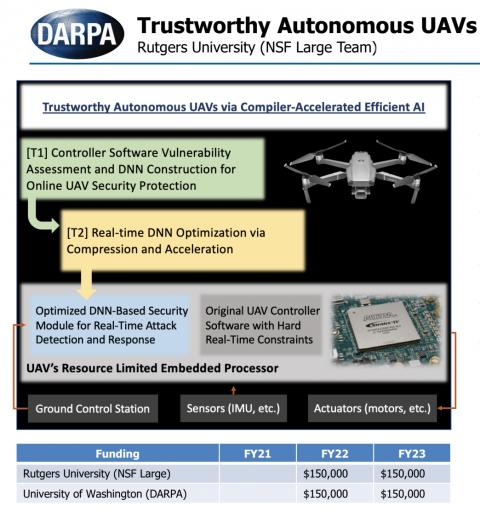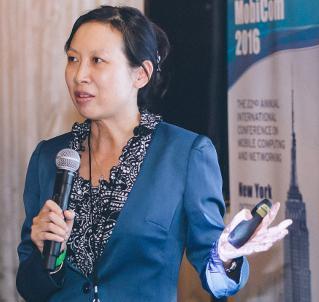Emina Soljanin receives NSF Grant for Enabling Low-Latency Communications Services
ECE Professor Emina Soljanin is the recipient of a new NSF award for the research project titled "Service Rates of Codes." This three-year $500,000 project is funded by the Communication and Information Foundations (CIF) program that supports foundational computer science and engineering research and education to advance the areas of communication, information theory, signal processing and networking.
Distributed storage platforms support major systems that operate under high uncertainty but have strict, low-latency requirements. Such systems include health (remote surgery), finance (electronic trading), commerce (online shopping), cloud gaming, self-driving cars, and augmented reality. In most of these emerging applications, users’ instantaneous and expected numbers and their data interests extensively fluctuate. Therefore, traditional storage solutions, designed and provisioned to satisfy specific expected demands, are inadequate. This project first postulates a new metric that should be an essential consideration in designing efficient distributed storage that must provide low latency for time-sensitive applications and remain stable under high uncertainty. It then offers optimal storage solutions. Besides that, it advances the fundamentals of coding theory, optimization on graphs, and real and finite geometry.
More details on the project can be found on the NSF page here.
Congratulations Emina!
ECE Researchers receive NSF Supplement Grant to develop Trustworthy Autonomous UAVs via Compiler-Accelerated Efficient AI
A team of Rutgers ECE researchers led by Associate Professor Dario Pompili (PI) along with co-PIs Saman Zonouz (Associate Professor) and Bo Yuan (Assistant Professor) are the recipients of a $280K supplement award from the National Science Foundation under the DARPA-NSF Real-Time Machine Learning (RTML) program for the project titled "Trustworthy Autonomous UAVs via Compiler-Accelerated Efficient AI,” in collaboration with the University of Washington (UW).
The ECE team will optimize their developed Deep Neural Network (DNN)-based Unmanned Aerial Vehicle (UAV) controller security solutions (via firmware reverse engineering and symbolic execution) that include real-time intrusion detection and response capabilities. This project will enable trustworthy UAV flight operations despite complex security attacks via optimized distributed deployment of data-driven AI-based intrusion resilience on UAVs resource-limited processors. The technical challenges addressed in the project include: (1) Accurate and optimal security monitoring and decision making for flight-time attack detection and response; and (2) Resource-optimization and DNN acceleration for execution of security solutions side-by-side along with the drone’s main controller software stack. Success will be measured via full flight demonstration of security-enhanced UAV controllers against various attack types, e.g., Denial of Service (DoS), false data injection, and vulnerability exploitation. As part of this DARPA-NSF collaborative program, the team will deliver the first working solution and open research directions for use of real-time efficient AI for security protection of cyber-physical safety-critical platforms even beyond UAVs.
More details on the project can be found at the NSF page here.
Congratulations Dario, Saman and Bo!
Guest Speaker Series: Efficient AI Seminar with Dr. Yiyu Shi
You're Invited!
Join on Zoom
Meeting ID: 997 6775 7379
Passcode: 841143
ECE Colloquium - Dr. Yixin Wang, University of Michigan
Speaker: Dr. Yixin Wang, University of Michigan
Talk Title: Representation Learning: A Causal Perspective
ECE Researchers receive NSF grant for Securing IoT and Edge Devices under Audio Adversarial Attacks
Powered by the advancement of artificial intelligence (AI) techniques, the next-generation voice-controllable IoT and edge systems have substantially facilitated people’s daily lives. Such systems include voice assistant systems and voice authenticated mobile banking, among many others. However, the underlying machine learning approaches used in these systems are inherently vulnerable to audio adversarial attacks, in which an adversary can mislead the machine learning models via injecting imperceptible perturbation to the original audio input. Given the widespread adoption of voice-controllable IoT and edge systems in many privacy-critical and safety-critical applications, e.g., personal banking and autonomous driving, this project will investigate the severity and consequences of the audio-based adversarial attack and develop the corresponding defense solutions. The research outcome of this project will provide a solid foundation for building trustworthy voice-controllable IoT and edge systems. The developed defense techniques will improve the security of many intelligent audio systems, such as automatic speech recognition (ASR), keyword spotting, and speaker recognition.
Guest Speaker Series: Efficient AI Seminar with Dr. Adrian Balaut
You're Invited!
To join us on Zoom:
Meeting ID: 967 9393 6669
Passcode: 893809
Rutgers Team receives NSF Grant for Enabling Spectrum Coexistence of 5G and Passive Weather Sensing
An interdisciplinary team of Rutgers researchers led by WINLAB Distinguished Professor Narayan Mandayam (PI) along with co-PIs Chung-Tse Michael Wu (Assistant Professor, ECE), Ruo-Qian Wang (Assistant Professor, CEE) and Joseph Brodie (Director of Atmospheric Sciences) are the recipients of an award from the National Science Foundation under the Spectrum and Wireless Innovation enabled by Future Technologies (SWIFT) program for the project "Enabling Spectrum Coexistence of 5G mmWave and Passive Weather Sensing." This three-year project funded at $750,000 addresses an emerging topic of increasing interest, namely the opening up of newer and higher spectrum for communication uses and the unintended effects on passive devices and legacy services not directly related to communications.
Yingying Chen receives MxD Grant for Securing Voice Control Technology in Digital Manufacturing
ECE Professor Yingying Chen received an award from Manufacturing x Digital (MxD) for the project “Securing Voice Control Technology in Manufacturing via Low Effort Authentication.” In partnership with the Department of Defense (DoD), MxD equips U.S. factories with the digital tools, cybersecurity, and workforce expertise needed to strengthen U.S. manufacturing. This multi-year renewable collaborative project with Texas A&M funded at $75,000 for the first year, investigates low-cost authentication solutions to tackle the security vulnerabilities in voice assistants (VA) at manufacturing plants. Voice assistants (VA) are becoming the one-stop hub for Industrial IoT-enabled manufacturing plants. With hands-free interaction, the use of voice technology offers a great advantage for the human operators during manufacturing cycles and in factory floors for better safety, productivity and efficiency. However, the convenience of using voice control technology in manufacturing also opens the door for adversaries to access a company’s private and critical information, and perform unauthorized actions. This project aims to design cross-domain (in both audio and vibration) low-effort authentication to defeat various attacks on voice assistant systems including impersonation attacks (whereby the adversary can fool the systems by imitating the legitimate user’s voice), replay attacks (via a simple record-and-replay of the user’s voice commands) and hidden voice attacks (whereby the adversary embedded malicious commands in music to access VA systems surreptitiously).
Congratulations Yingying!
ECE TA Meeting
All ECE TAs are expected to attend.



